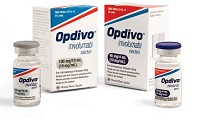Merck's Keytruda and Bristol-Myers' Opdivo may have the next-gen cancer immunotherapy market to themselves for now. But Roche is in catch-up mode, and some new data add to its case for a sooner-rather-than-later regulatory approval.
In a midstage bladder cancer study, Roche's atezolizumab hit its goal by shrinking tumors in a particular group of patients. The PD-L1 inhibitor, designated a "breakthrough" therapy at the FDA, delivered a bigger response in patients with higher levels of PD-L1 expression, the company said.
Roche ($RHHBY) figures that PD-L1 target gives atezolizumab an edge against Merck ($MRK) and Bristol-Myers ($BMY) meds, which both target PD-1. As FierceBiotech reports, Roche's Genentech unit sees PD-L1 as a more significant engine in cancer, and the company is betting that over the long term, atezolizumab can show a more long-lasting treatment effect with less toxicity risks.
Plus, with data showing that PD-L1 status is linked with atezolizumab response--in this new bladder cancer trial as well as a non-small cell lung cancer study headlined in May--Roche can leverage its own diagnostic unit to tag the best patients for the drug. That could be a selling point for payers, which prefer to shell out their money for therapies that will actually deliver results.
 Roche will need some talking points when it does launch atezolizumab. Bristol-Myers' Opdivo already has a couple of indications to its credit, and analysts see its early advantage in the field bearing out big-time over the coming years, with sales estimates of $8.8 billion in 2020, according to EvaluatePharma. Merck's Keytruda is several billion behind that figure at $5.5 billion in projected 2020 sales.
Roche will need some talking points when it does launch atezolizumab. Bristol-Myers' Opdivo already has a couple of indications to its credit, and analysts see its early advantage in the field bearing out big-time over the coming years, with sales estimates of $8.8 billion in 2020, according to EvaluatePharma. Merck's Keytruda is several billion behind that figure at $5.5 billion in projected 2020 sales.
Right now, atezolizumab carries a consensus sales forecast of just over $2 billion. But that could change as new data roll out; Roche is driving some 36 studies toward a broad case for the drug. It's also hard at work on atezo-based combination therapies that could boost the PD-L1 drug's sales while adding revenue from the companion med to the mix.
- see the release from Roche
Special Reports: Top 15 pharma companies by 2014 revenue - Roche | Top 10 best-selling cancer drugs of 2013